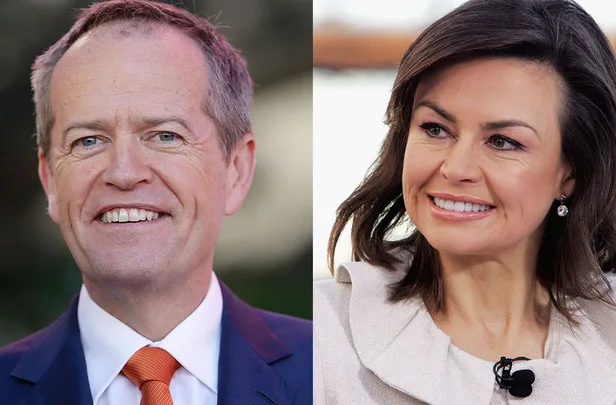Jacqueline Maley is a political columnist with the Sydney Morning Herald
Congratulations, gentlemen. We are officially half way through the election campaign and you have finally captured our attention.
On Monday Prime Minister Malcolm Turnbull self-identified as a feminist. Opposition leader Bill Shorten released a generous childcare policy, and then set off a storm by asserting that women handle the childcare in most households. Television journalist Lisa Wilkinson accused the Opposition leader of perpetuating stereotypes. The ABC’s Leigh Sales asked an awkward Mathias Cormann, the Coalition’s election spokesman, if he also was a feminist.
After a long season of being all but forgotten in the political debate, the leaders have generously placed “women’s issues” back in the policy spotlight, perhaps after consulting with their respective grey-beards, who reminded them that yes, women do comprise 50 per cent of the population, and therefore throwing them a bone is probably necessary.
Yes, in fact, women do comprise 50 per cent of the population
Shorten got the ball rolling when he released Labor’s childcare policy – which promises to boost the childcare benefit by 15 per cent, increase the cap on the childcare rebate and devote more money to areas where there are huge waiting lists.
It’s not cheap though. The package costs $3 billion, which the Coalition says is unfunded (a claim Labor denies, unsurprisingly). Labor also pledged more money for after-school care, because as working mothers know, your real problems start when children go to school and you are obliged to do an all-new version of the walk of shame: out of the office in the mid-afternoon to pick them up by 3pm.
The government’s childcare policy came with some baggage. Former Prime Minister Tony Abbott had come to power promising Australian women a “gold-plated” Paid Parental Leave policy, which replaced their actual income rather than giving all women the same base payment.
But under pressure from the economic hardheads and conservatives in his own party, and from others who thought the money would be better spent on childcare reform, Abbott ditched it unceremoniously.
The present Coalition childcare policy promises to simplify the rebate and target it better. It is also meant to make sure kids from lower socio-economic households can still access childcare even if their parents aren’t working.
But the policy is stuck in the senate, making it hard for the government to promote this election. And so, a cynic might say it suited the government better to quickly turn debate over the generous (although opaquely funded) Labor policy into a bitchfight about sexism.
At a press conference on Monday Shorten said, “Let’s face it, men in Australia rely on the women in Australia to do the childcare and to organise childcare”. Was this a betrayal of outdated gender views or simply a statement of (sad) fact? Journalist Lisa Wilkinson thought it was the former, and editorialised to that effect. Deputy Nationals leader Fiona Nash said Shorten’s language was “prehistoric”. Labor Senator Penny Wong zinged back and asked if she had met Barnaby Joyce.
And there we were, stuck in a Gillard-era-lite version of a debate over sexism, which may be a useful political diversion, but distracts from the important issues at stake.
And there we were stuck in a Gillard-era-lite debate over sexism
How can women stay connected to the workforce while child-rearing? How can they ensure their financial security while also mothering? How can the Australian economy best capture the capacity of mothers? Whose job is it to worry about the kids? And whose job should it be?
Meanwhile, Turnbull released a genuinely touching campaign ad about his childhood being raised by a single dad. It was pitched to humanise him, perhaps largely in the eyes of female voters. It is presumably for the same reason he called himself a feminist. We can allow perhaps a small pause while we quietly thank the she-gods that adherence or otherwise to feminism is something that political leaders genuinely need to take a position on these days.
And then we can look those leaders in the eye and say: “That’s great that you are a feminist. Now, tell me what your policies for women are.”
For more stories from Jacqueline Maley, visit the Sydney Morning Herald
Prime Minister Malcolm Turnbull’s video about his father, below.
 Getty
Getty









